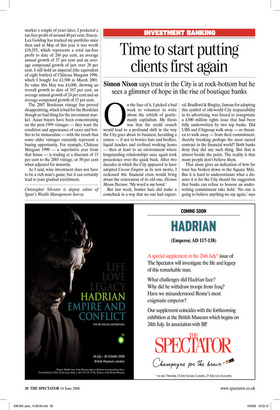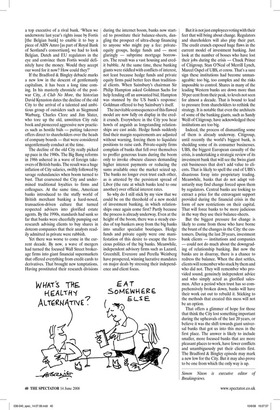Time to start putting clients first again
Simon Nixon says trust in the City is at rock-bottom but he sees a glimmer of hope in the rise of boutique banks On the face of it, I picked a bad week to volunteer to write about the rebirth of gentlemanly capitalism. My thesis was that the credit crunch would lead to a profound shift in the way the City goes about its business, heralding a return — if not to bowler hats and brollies, liquid lunches and civilised working hours — then at least to an environment where longstanding relationships once again took precedence over the quick buck. After two decades in which the City appeared to have adopted Caveat Emptor as its new motto, I reckoned this financial crisis would bring about the restoration of its old one, Dictum Meum Pactum: ‘My word is my bond.’ But last week, bowler hats did make a comeback in a way that no one had expect ed. Bradford & Bingley, famous for adopting this symbol of old-world City respectability in its advertising, was forced to renegotiate a £300 million rights issue that had been fully underwritten by two top banks. Did UBS and Citigroup walk away — or threaten to walk away — from their commitment, thereby breaking perhaps the most sacred contract in the financial world? Both banks deny they did any such thing. But that is almost beside the point. The reality is that many people don’t believe them.
That alone gives an indication of how far trust has broken down in the Square Mile. But it is hard to underestimate what a disaster it is for the City should the suggestion that banks can refuse to honour an underwriting commitment take hold. ‘No one is going to believe anything we say again,’ says a top executive of a rival bank. ‘When we underwrote last year’s rights issue by Fortis [the Belgian bank] to enable it to buy a piece of ABN Amro [as part of Royal Bank of Scotland’s consortium], we had to look Belgian, Dutch and EU regulators in the eye and convince them Fortis would definitely have the money. Would they accept our word for it now? How could they?’ If the Bradford & Bingley debacle marks a new low in the descent of gentlemanly capitalism, it has been a long time coming. In his masterly chronicle of the postwar City, A Club No More, the historian David Kynaston dates the decline of the old City to the arrival of a talented and ambitious group of outsiders such as Siegmund Warburg, Charles Clore and Jim Slater, who tore up the old, unwritten City rule book and pioneered aggressive new practices such as hostile bids — putting takeover offers direct to shareholders over the heads of company boards — that were considered ungentlemanly conduct at the time.
The decline of the old City really picked up pace in the 1980s. The Big Bang reforms in 1986 ushered in a wave of foreign takeovers of British banks. The result was a huge inflation of City salaries, swiftly followed by savage redundancies when boom turned to bust. That coarsened the City and undermined traditional loyalties to firms and colleagues. At the same time, American banks introduced to the stuffy world of British merchant banking a hard-nosed, transaction-driven culture that turned respected advisers into glorified estate agents. By the 1990s, standards had sunk so far that banks were cheerfully pumping out research advising clients to buy shares in dotcom companies that their analysts readily admitted in private were rubbish.
Yet there was worse to come in the current decade. By now, a wave of mergers had turned the focused Wall Street brokerage firms into giant financial supermarkets that offered everything from credit cards to derivatives. That brought new temptations. Having prostituted their research divisions during the internet boom, banks now started to prostitute their balance-sheets, dangling the prospect of ultra-cheap financing to anyone who might pay a fee: privateequity groups, hedge funds and — most glaringly — subprime mortgage borrowers. The result was a vast housing and credit bubble. At the same time, these banking giants were riddled with conflicts of interest, not least because hedge funds and private equity firms paid better fees than traditional clients. When Sainsbury’s chairman Sir Philip Hampton asked Goldman Sachs for help fending off an unwanted bid, Hampton was stunned by the US bank’s response: Goldman offered to buy Sainsbury’s itself.
The inevitable consequences of this flawed model are now fully on display in the credit crunch. Everywhere in the City you hear howls of anguish as longstanding relationships are cast aside. Hedge funds suddenly find their margin requirements are adjusted without warning, forcing them to liquidate positions to raise cash. Private-equity firms complain of banks that fell over themselves to proffer generous loans during the boom only to invoke obscure clauses demanding higher interest payments or reducing the sums available once the market seized up. The banks no longer even trust each other, as is attested by the persistent spread of Libor (the rate at which banks lend to one another) over official interest rates.
So why do I still stick by my view that we could be on the threshold of a new model of investment banking, in which relationships once again come first? Partly because the process is already underway. Even at the height of the boom, there was a steady exodus of top bankers away from the big banks into smaller specialist boutiques. Hedge funds and private equity were one manifestation of this desire to escape the ferocious politics of the big banks. Meanwhile, independent advisory firms such as Lazard, Greenhill, Evercore and Perella Weinberg have prospered, winning lucrative mandates on major deals by stressing their independence and client focus. But it is not just employees voting with their feet that will bring about change. Regulators and shareholders will also play their part. The credit crunch exposed huge flaws in the current model of investment banking. Just look at the number of bosses who have lost their jobs during the crisis — Chuck Prince of Citigroup, Stan O’Neal of Merrill Lynch, Marcel Ospel of UBS, et cetera. That’s a sure sign these institutions had become unmanageable: too big, too complex and the risks impossible to control. Shares in many of the leading Western banks are down more than 50 per cent from their peak, to levels not seen for almost a decade. That is bound to lead to pressure from shareholders to rethink the strategy. It is notable that even the architects of some of the banking giants, such as Sandy Weill of Citigroup, have acknowledged these institutions are too big.
Indeed, the process of dismantling some of them is already underway. Citigroup, until recently the world’s biggest bank, is shedding some of its consumer businesses. UBS, the biggest European casualty of the crisis, is undertaking a strategic review of its investment bank that will see the Swiss giant exit businesses that don’t add value to clients. That is likely to spell the end of UBS’s disastrous foray into proprietary trading. Meanwhile, banks that do not adapt voluntarily may find change forced upon them by regulators. Central banks are looking to extract a price for the extravagant support provided during the financial crisis in the form of new restrictions on their capital. That will force banks to be more judicious in the way they use their balance-sheets.
But the biggest pressure for change is likely to come from those who have borne the brunt of the changes in the City: the customers. During the last 20 years, investment bank clients — institutions and companies — could not do much about the downgrading of relationship banking. But now the banks are in disarray, there is a chance to redress the balance. When the dust settles, clients will remember who stuck by them and who did not. They will remember who provided sound, genuinely independent advice and who simply acted as glorified salesmen. After a period when trust has so comprehensively broken down, banks will have their work cut out to rebuild it. Sticking to the methods that created this mess will not be an option.
That offers a glimmer of hope for those that think the City lost something important during the upheavals of the last 20 years, or believe it was the shift towards giant universal banks that got us into this mess in the first place. The answer is likely to include smaller, more focused banks that are more pleasant places to work, have fewer conflicts and unambiguously put their clients first. The Bradford & Bingley episode may mark a new low for the City. But it may also prove to be one from which the only way is up.



















































































 Previous page
Previous page